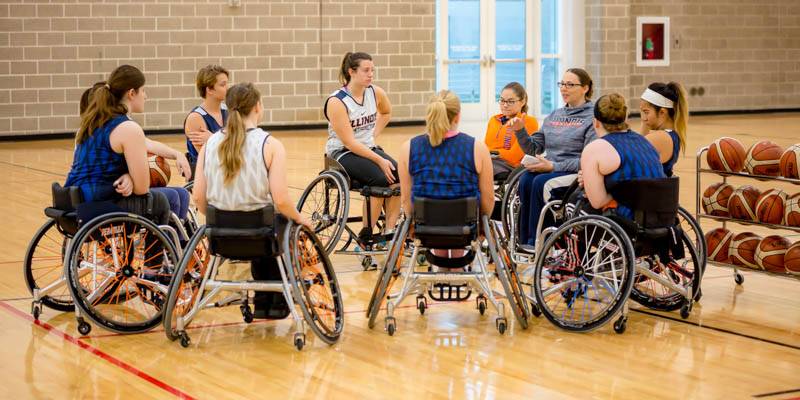The University of Illinois and the National Wheelchair Basketball Association go hand-in-hand. “Father of Accessibility” Dr. Tim Nugent founded the university’s Division of Rehabilitation Education Services, the first higher education program for individuals with disabilities, in 1948. That same year he organized the National Wheelchair Basketball Association, and the first National Wheelchair Basketball Tournament, an intercollegiate championship tournament that continues, and will be held at the State Farm Center March 14-16, 2019. This year the tournament is coming home.
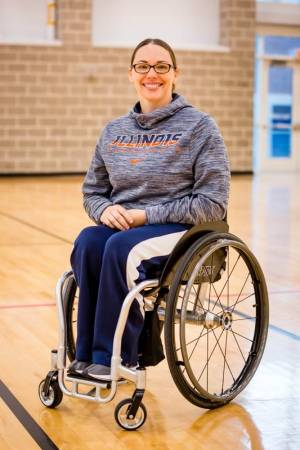 Home to a place Women’s Wheelchair Basketball Head Coach Stephanie Wheeler has wanted to be since she was 13. “I’m so fortunate that I found U of I, and that U of I found me, because I couldn’t imagine being anywhere else.”
Home to a place Women’s Wheelchair Basketball Head Coach Stephanie Wheeler has wanted to be since she was 13. “I’m so fortunate that I found U of I, and that U of I found me, because I couldn’t imagine being anywhere else.”
University of Illinois hosts Wheelchair Sport Camp every summer, and it was there that she saw her future as a student athlete. “[Camp] was the first time that I saw I could go to college and play sports, and I was blown away. I was like ‘yes, this is where I want to be.’ I have memories of being out there in [the DRES] lobby, eating meals with other kids at camp here in this building. Sharing the experience with older adults and college-aged people who had disabilities and played sports, and it was eye-opening and amazing.”
Wheeler grew up in small-town North Carolina, “where basketball is everything.” She was an athletic child, and acquired her injury at 6. A chance meeting in a doctor’s office waiting room opened her world to wheelchair basketball, and the next weekend her family began driving her two hours away to practice. “I was really fortunate that the parent approached us, but also that my family was so supportive to give me this opportunity to be physically active. That year for Christmas all I asked for was a hoop in my backyard. I just wanted a hoop, a bit of pavement, and a basketball and I was happy.”
It was another wheelchair summer camp in Indiana that officially started her path to Illinois. “The summer before my senior year of high school, [University of Illinois’ Women’s Wheelchair Basketball] head coach Mike Frogley approached me, and it changed my world,” she said. “He said he liked the way I played and asked if I wanted to come to Illinois. I thought, ‘I can make this happen. I know I can get into school. My family might not like it that I want to go so far from home’, but it reopened doors for me, and there was no way that I wasn’t going to do it. I was ready to get out of North Carolina. I needed to be somewhere where I could be stretched as a person and an athlete, and I knew that I wasn’t going to get that by just going to college. I needed to have that student-athlete experience.”
Being a student-athlete led to her finding her future in coaching. “When you’re a student athlete here, you’re required to coach at those summer camps,” she explained. “That’s where I got my first love for coaching. Not only did I love it, but I felt like I was good at it, and my coach Mike Frogley saw the same thing. ‘Wow, she’s a good teacher, she really loves it.’”
Frogley is a mentor who has been a part of Wheeler’s path in wheelchair basketball from late high school through her position today. “He started taking me to camps around the country and around the world. He really invested in me, I think he saw my potential,” she said. “He’s been the one person that has been in my corner to help me navigate these opportunities.”
“When this job [for Illinois Women’s Wheelchair Basketball head coach] opened up in 2009 I felt like I was ready, and Mike reached out to me. He called and said ‘I think this is the opportunity for you.’ And that was it. I was back. I was ready to come back. I wouldn’t want to coach anywhere else in the world. This is it. This is the dream job.”
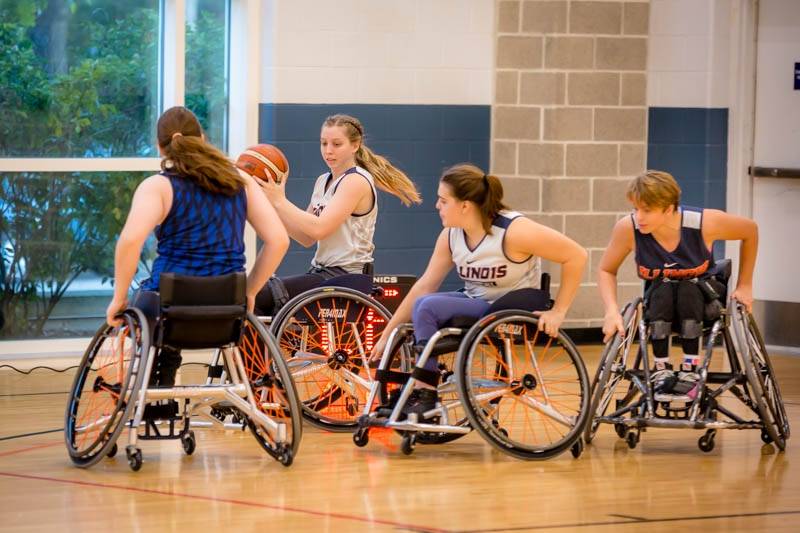
The job at Illinois is not just coaching a team of basketball players, but being part of a program that started it all. “When our program was started, it was started with a notion of excellence. Everything that we do, we do to a certain standard and to a certain level, and I think that’s a big reason we’ve been successful,” said Wheeler. “Everyone that we bring into the program knows that is the expectation. All the wonderful things that have been accomplished by the people in our program spur you on to do greater things. It’s inspiring.”
“It’s not about winning and losing on the court. We do that, but it’s not what we hang our hat on, and it’s not what we choose to define as success for ourselves. Our success is defined by what the people in our program do once they graduate and while they’re here. I think that has created this sustainable model of excellence.”
Illinois Wheelchair Athletics, which includes basketball and track, is a part of the College of Applied Health Sciences, and finds many collaborative research and development areas throughout the university. “We’ve always had an eye for forward-thinking and for innovation here. We’ve always been on that cutting edge of moving disability sport forward.”
Wheeler says connections with Kinesiology, Recreation Sport Tourism, and Engineering make the program a “great environment for forward thinking, creativity, innovation, and wanting to be a part of what’s happening next. When you combine all of those things: the really good people, those who want to be excellent, the ones who aren’t daunted by the tradition but want to add to it, then you get this environment that breeds success because you want to work hard.”
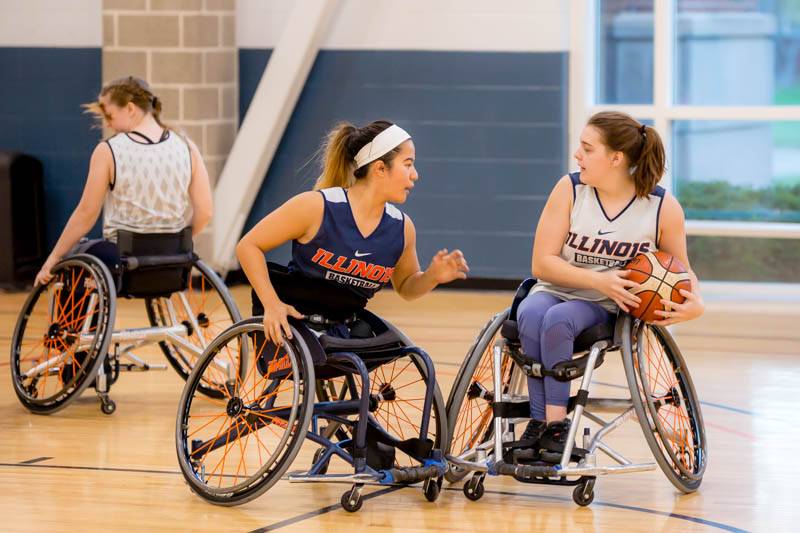
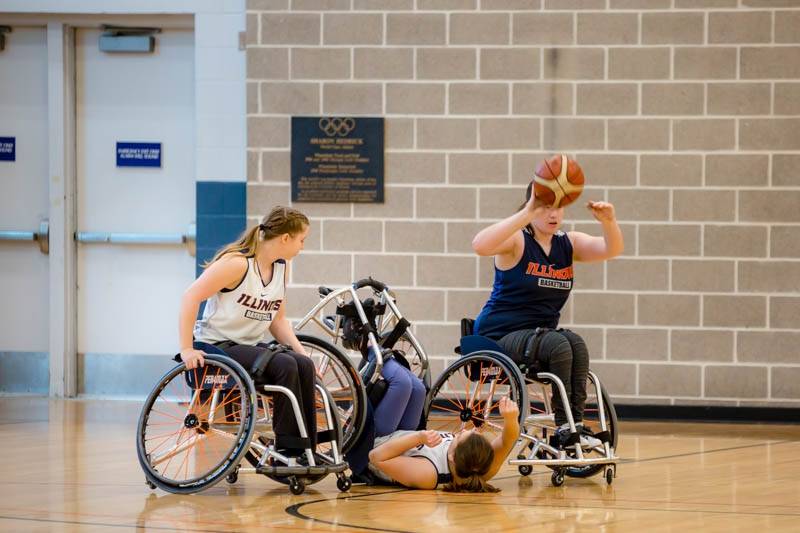
That hard work is shown in their rigorous schedule. Illinois Wheelchair Basketball practice is held at the ARC every weekday morning from 6:30 to 9:30 a.m. from the start of October until mid-March. The men’s and women’s teams travel together to weekend tournaments every year throughout the U.S. and Canada.
This year the Illinois tournament will be held in the ARC February 8-9, and the National Championship Tournament will be held here March 14-16. “We are so excited to host in the State Farm Center. We really want to make this a great event for the university community and the Champaign-Urbana community to see how amazing our student-athletes are, and how amazing our sport is.” She said she got goosebumps thinking about the opportunity. “It’s such a great venue for basketball, and to have the opportunity to be there in front of our community will be incredible.”
As is natural with a university, getting the word out about their program is a continual education process. Annual turnover in students means a new group to teach about the success and excellence of Illinois Wheelchair Athletics. “We hear all the time that people didn’t know we had a wheelchair basketball program. When people know about us, we feel supported in the community.”
“I’m not taking for granted where we are, with this open and welcoming community. We have to work to keep it that way.” She is concerned about the layers of accessibility being threatened in the country today. “Historically because of the [Americans With Disabilities Act] the U.S. has been better than the rest of the world when it comes to accessibility, but it’s currently under attack. We’re at a moment in time that’s very pivotal for our nation for individuals with disabilities.”
“It makes me really nervous not just for physical accessibility, but for access to education and healthcare. The rights to be a full, valued human being in society and all that it encompasses is in danger of being taken away. We’re in a place where we might not be the same for a generation,” she said. “What this moment calls for is looking at things from an intersectional perspective. It’s a scary time that accessibility is under attack, and that women are under attack, and women with disabilities, and women of color with disabilities, gay women with disabilities,” she continued. “It’s sobering.”
“What I love about Champaign is that it is a progressive community,” she said. Wheeler lives in Champaign with her partner Laura, Laura’s son Cody, their cat, Dashel, and dog, Zero. “I’m not afraid to hold hands with my partner here. I feel happy and supported here, and I can be who I am. My family is safe and happy here. I wouldn’t want to be anywhere else.”
Photos by Scott Wells








